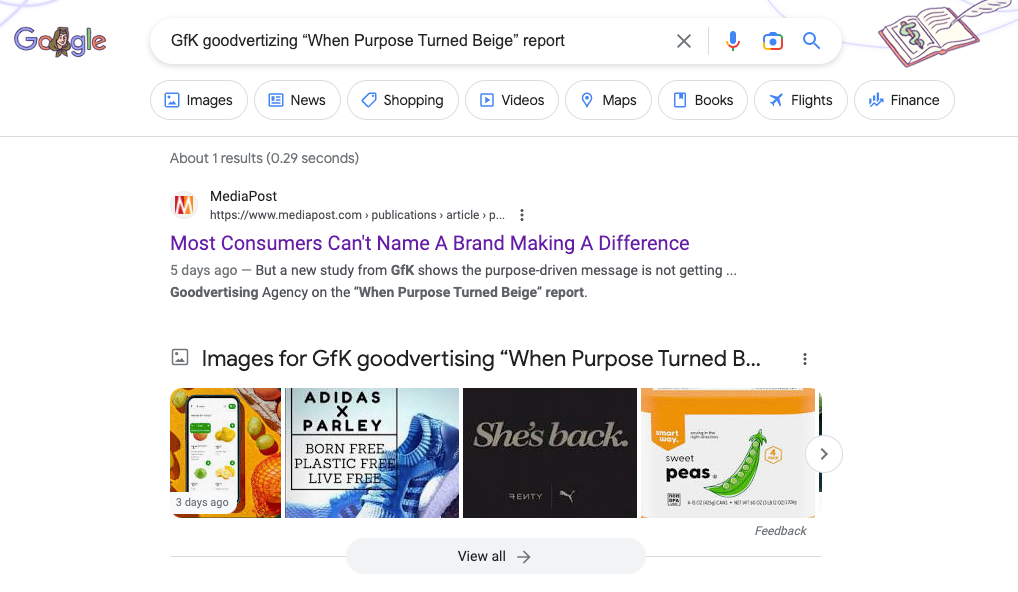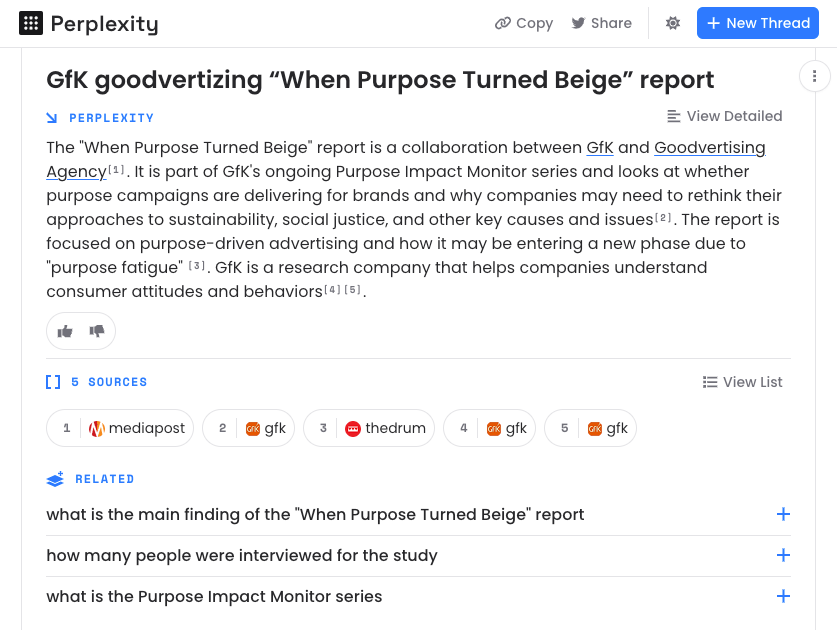Breaking the Google Habit
Google is no longer the only search game in town.

- Google is no longer always the fastest and most reliable way to find information. It failed to find a report, while Perplexity succeeded.
- The quality gap between search competitors is narrowing; some offer new benefits (e.g., privacy, simplicity, content generation).
- Google's dominance is not in immediate danger, but its long-term evolution is uncertain, as actual alternatives begin to emerge.
I've been an enthusiastic Google user since the beginning, more than 20 years ago. It was consistently the fastest and most reliable way to find information online. That's no longer true.
Here's an anecdotal case-in-point: this week I was reading an article on Mediapost about the declining impact of "purpose driven marketing." The article was based on a survey from Gfk in collaboration with the Goodvertising agency. For whatever reason, Mediapost rarely links out to the sources or studies they're writing about.
Google couldn't find it
I wanted to read the study itself because this is an issue I'm very interested in: brand perceptions, corporate ethics and the impact of social responsibility marketing on consumer behavior. So naturally I input a query with the companies and report title into Google: "GfK goodvertizing 'When Purpose Turned Beige' report."

I assumed my query would surface the report landing page, a relevant blog post or at least the Gfk site. Instead, what I got was a single result: the same Mediapost article I had read. There were literally no other results – strangely.
Perplexity did
I reformulated the query in a couple of different ways and didn't get any closer to the report. I could have gone to BingGPT, DuckDuckGo or Neeva but I went next to Perplexity.ai just to see whether it would do any better. It did.

I used the identical query I had searched on Google. Perplexity not only found the Mediapost article, it also located a Drum article about the study and several relevant pages on the Gfk site, including the report download page. This kind of floored me – clearly a better result than Google had given me.
Before you object that this is just one search, I obviously realize that. A more systematic comparison of SERPs across 500 keywords and phrases would probably reaffirm Google supremacy. But Google's infallibility facade is cracking.
Cracks in the infallibility facade
The company has been very busy with various algorithm updates and formatting tweaks, trying to improve SERP trust and credibility, beat back spam and "SEO chum," fend off TikTok and, most recently, confront the emerging AI threat. That's what Perplexity represents; it's a chat UI that positions itself as a search engine.
Google maintains its own AI entry, Bard, is not a search replacement.
The quality gap between Google and Bing has narrowed over time and other search engines (e.g., DuckDuckGo) are pretty good or "good enough" in many cases. Google has remained so dominant partly because it's marginally better but also because its usage is habitual for most people. "Google is the best why use anything else?"
There are now several answers to that question: some search engines offer greater privacy, some have a less cluttered UI and some can find things that Google apparently can't.
Breaking the habit
GPT and large language models have well-documented issues including accuracy and sourcing. They're not as good as traditional search for certain types of queries and research. And they're not great for local – though they have potential.
Yet AI also enables use cases that current search engines don't. For example, I generated an initial draft of the bulleted summary for this article using ChatGPT. And sometimes AI is faster and cleaner than sifting through a Google SERP and multiple links.
Google is still an amazing resource and its search dominance isn't in any immediate danger. But longer term, "search" will be very different than it is today. And the question is: can Google evolve and not fall victim to "the innovator's dilemma." That remains an open question.
For the first time in many years, actual alternatives to Google are starting to emerge. As a focus group of one, I see that in my own changing search habits.
Postscript: David Mihm pointed out to me that this is really a Gfk problem, not a Google problem. By not including the report title on the landing page it prevents Google from returning a result for that exact phrase. I put the report title in quotes. I acknowledged his insight; however, Perplexity was able to find the landing page using the identical query – Google wasn't.

